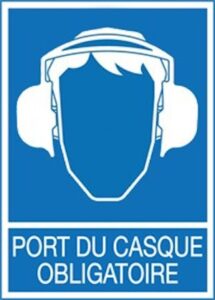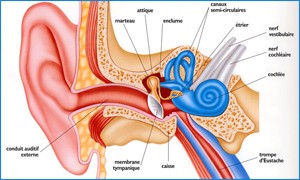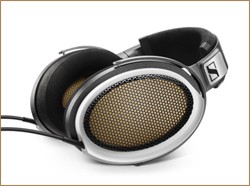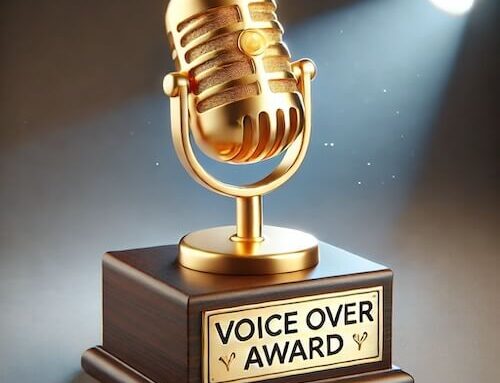Voice over recording: wear headphones at all times?
Can the cans cancan?

So, headphones or not?
The voice actors critics of wearing headphones point out that they prefer to concentrate on their performance rather than the sound of their voice. It's a bit like a Formula 1 driver saying he'd rather not wear his safety harness because it interferes with his driving: wearing cans allows us to concentrate on our work. Even if you are in an acoustically treated booth (which is - or should be - the case for any professional French voice actor or of any nationality) there is an interaction between the room and us. Our internal radar, which allows us, mammals that we are, to know where we are, is constantly working. Headphones remove this parasitic interaction by isolating us from the outside world.
By using headphones when recording a voice over, we can hear exactly what is being recorded. If we make a mouth noise that should generate a repeat, without headphones, it's only on re-listening that it would become apparent. And getting back into the same feeling is more difficult than stopping and doing a repeat immediately, staying in the feeling.
We listen to ourselves talk. Yes, we do
There's another reason, a physiological one. When someone else speaks to us, they are in fact emitting pressure waves into the air, a bit like the ripple of water after a stone has been thrown into it. We receive these pressure waves through our eardrums (and then the ossicles), which vibrate at different speeds depending on the frequency of the waves (the speed at which they are emitted). These vibrations are processed by a small organ called the cochlea, which helps to transform them into electrical signals that our brain then decodes into sounds.

The only way to hear what others hear is to bypass this effect by wearing headphones. You'll find a fascinating article exploring the topic of subjective perception of our own voice here .
On the same subject, I also invite you to have a look at this TEDtalk by Rébecca Kleinberger, a voice scientist.
The voice, just one of the instruments in the orchestra
And finally, perhaps the most important reason of all. If the project we're working on contains a soundtrack (TV or radio ad, web promo, corporate video...), recording your voice without taking this soundtrack (or M&Es for our English-speaking friends) into account is an aberration - a subject I also address in my article A Question of Organs. It's a bit like recording the bass without taking the other instruments into account. The voice is only one of the elements in the mix and must be in harmony with the other elements in terms of intention, tonality, rhythm and evolution. And when you record overdub, in order to follow the original version, you obviously need to be able to... follow it.
Cans all right, but which cans then?
In the booth, you must imperatively wear a closed-back headphone to prevent the bleed that would interfere with your take. Avoid hi-fi models in favour of more neutral, professional headphones, which don't 'colour' the sound, and are designed specifically for the rougher environment of the studio and to be worn comfortably for long periods.
Which brand? Everyone has their own preferences, so do a test in shop and see which one suits you best. My personal preference is for Beyer Dynamic DT150 for recording; it's neutral, very comfortable, has no bleed and is built to withstand a nuclear attack, or almost.
For critical listening, my preference is for DT770 Pro 80 Ohms from the same brand - it's too 'bright' for my taste to record with, but it's just as neutral, is even more comfortable and has phenomenal clarity.
The most expensive headphones? The one pictured on the right, sublime, it's theOrpheus HE 1 by Sennheiser. Great, if you can fork out around €50,000 - yes, with four zeros after the 5. It comes with its own tube preamp, but you're out of luck, it's an open-back headphone. Too bad, you'll have to keep looking!
Thank you for reading this article, and if you found it interesting, please share it with your friends and colleagues on your social media. It's good for your karma!
I invite you to share your experience here and leave your comments, suggestions or questions - I'll do my best to answer them!
PS: by subscribing to this voice over blog, you will have exclusive access to new articles before they are officially published. It's free so make the most of it, subscribe now !






Pierre,
I love the way you added substance to this post by linking to various resources. That TED talk, in particular, was fascinating.
I came into this post sort of pre-armed to defend the perspective that I've learned over the years to use headphones as little as possible.
In my specific case, the fact that not a single voice actor takes the same journey to the microphone as another is important to acknowledge.
I became a radio announcer at 15, working in English, my second language. I was already very fluent and unaccented - a gift from my father's side of he family.
However, it was important that I always sounded "older and more mature" because the radio station's audience was older adults.
At 15, all "older adults" are walking caricatures, so I attempted to sound like I thought they'd want me to sound, without any idea what that might be. LOL.
In any case, we always wore headphones, and I always carefully monitored my voice to ensure I "conformed" to whatever mistaken idea I had about the target audience, and so on.
When I started working full-time as a voice actor, one of my first coaching sessions was with a remarkable voice coach, Marice Tobias. She's worked with everyone from Marlon Brando to Donald Sutherland to Don LaFontaine to the great unwashed mass of lesser-known but very successful voice actors across America and Canada in particular, but also throughout Europe.
When Marice first suggested that headphones were the 'enemy' of authentic performance for most performers, many voice actors who'd come from broadcasting backgrounds still had some of the same distortions in their external voice personalities as I did. Despite my actual physical discomfort at NOT wearing headphones in a performance, I tried it.
I remember feeling and hearing the difference in my performance when I first worked with her in the year 2000 or 2001 and I was astonished at the difference. In my case, not having the distorting effect of "monitoring" at the same time as I was trying to create a performance moment by moment, and IN the moment, was a key way for me to achieve a better result.
I recognise how my specific history serves me in this regard, and when I DO have to wear them, as in many of the same cases you would, I enjoy it but try not to enjoy it too much. Haha.
In any case, all that to add to the knowledge and experience you shared with us. Thank you.
You're welcome Paul! I wholeheartedly disagree with Marice - saying that cans are in the way of the performance is like saying to a Fomrula 1 pilot that a seat belt is in the way of his driving performance. Leaving alone the fact that wearing them is compulsory when recording a directed session or when we work with M&Es, we hear ourselves even when we don't wear cans - except we don't hear ourselves the way other people do, as I explain in the article. But at the end of the day, the proof is in the pudding: it obviously works for you, and that's what matters!